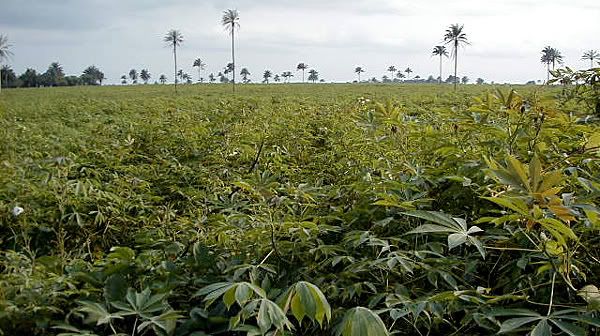Nigeria's NNPC launches 4 major biofuel projects covering 90,000 hectares
 Bids close on January 30 for expressions of interest for the Nigerian National Petroleum Corporation’s (NNPC) Renewable Energy Division, which is seeking coinvestors for a series of joint ventures, as part of its mandate to launch a large-scale biofuels industry in Nigeria. The tender was advertised in the South African and international press in December. The biofuels programme aims at leveraging Nigeria's vast agricultural potential to create wealth, employment and sustainable development in Africa's most populous country (earlier post).
Bids close on January 30 for expressions of interest for the Nigerian National Petroleum Corporation’s (NNPC) Renewable Energy Division, which is seeking coinvestors for a series of joint ventures, as part of its mandate to launch a large-scale biofuels industry in Nigeria. The tender was advertised in the South African and international press in December. The biofuels programme aims at leveraging Nigeria's vast agricultural potential to create wealth, employment and sustainable development in Africa's most populous country (earlier post).The initial phase of the programme includes the launch of four large-scale joint ventures, besides a set of fertiliser production plants and extension services that have already been created. The initiatives look as follows:
- the establishment of two sugarcane plantations covering 20,000 hectares, each with an ethanol, sugar and cogeneration plant
- a 10,000 hectare cassava farm with an ethanol plant
- a 20,000 hectare palm-oil plantation with an oil-extraction and biodiesel-conversion plant
- to strengthen the linkage between the oil and agriculture sectors, the NNPC has set up six agricultural resource and extension service centres
- plans to establish seven gas-fed fertiliser plants have reached an advanced stage; the plants will have a combined capacity of over ten million tons of fertiliser a year
- feasibility studies point at Benue, Gombe, Jigawa, Taraba and Kebbi states for large scale sugarcane plantations, while Anambra, Ondo, Edo states and Federal Capital Territory were identified for large scale cassava plantations.
The corporation has secured contiguous locations for the projects from local State authorities and has initiated detailed feasibility studies with international experts and public institutions. The NNPC has received a grant of €70 000 from Germany's Renewable Energy and Energy Efficiency Partnership to support detailed feasibility studies at the target locations:
 ethanol :: biodiesel :: biomass :: bioenergy :: biofuels :: energy :: sustainability :: oil palm :: sugarcane :: cassava :: Nigeria ::
ethanol :: biodiesel :: biomass :: bioenergy :: biofuels :: energy :: sustainability :: oil palm :: sugarcane :: cassava :: Nigeria ::An analysis has shown that the current national average cassava yield of 15 t/ha will be marginal, while the current sugar cane yield of 60 t/ha is sufficient and thus improving cassava yields becomes an imperative.
In an lecture titled ‘Energising Agriculture Through Gross Sectorial Linkages with the Oil and Gas Industry’ at the convocation ceremony of the Federal University of Agriculture, NNPC MD Funsho Kopolokun stated that Nigeria would earn US$150 million from the biofuels initiative.
He noted that the biofuel projects, which are part of the country’s alternative energy development strategies, are geared towards using the agricultural potential in cassava and sugar cane to produce ethanol that can serve as a good alternative to petrol.
Under the initiative, two types of automotive fuels are to be developed, namely ethanol fuel and palm oil diesel. According to Kopolokun, the ethanol programme is expected to slash automotive exhaust emissions in the country, reduce domestic use of petrol and free up more crude for export.
He disclosed that the corporation renewable energy project would also contribute significantly towards meeting some of the country’s energy needs. “It will also be a major plank on which the cross-sectorial linkages between the oil, gas and agricultural sectors will be laid. “In order to sustain the envisaged linkage of the oil industry with the agriculture sector, a robust fiscal legislative framework needs to be put in place,” Kopolokun added.
He said that, as part of efforts to strengthen the linkage between the oil and agriculture sectors, the NNPC has set up six agricultural resource centres, while plans to establish seven gas-fed fertiliser plants have reached an advanced stage. The plants will have a combined capacity of over ten-million tons of fertiliser a year.
Kopolokun emphasised that the plants would meet current and future domestic fertiliser demand expected to reach 2,4 million tons in 2010 and 3,2-million tons by 2015, with the excess being exported.
Image: cassava field, central Nigeria.
 -------------------
-------------------
 Spanish company Ferry Group is to invest €42/US$55.2 million in a project for the production of biomass fuel pellets in Bulgaria.
The 3-year project consists of establishing plantations of paulownia trees near the city of Tran. Paulownia is a fast-growing tree used for the commercial production of fuel pellets.
Spanish company Ferry Group is to invest €42/US$55.2 million in a project for the production of biomass fuel pellets in Bulgaria.
The 3-year project consists of establishing plantations of paulownia trees near the city of Tran. Paulownia is a fast-growing tree used for the commercial production of fuel pellets.









0 Comments:
Post a Comment
Links to this post:
Create a Link
<< Home